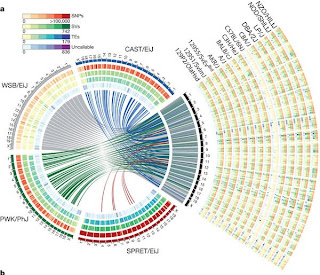Amniotes, the first truly terrestrial vertebrates, diverged from other animals some 320 million years ago to form the mammalian and reptilian lineages. Until now, however, the only representatives of the reptile branch to be sequenced were birds-the chicken, the turkey and the zebra finch.
Scientists from USA, UK and Sweden, recently reported the genome sequence of the North American green anole lizard, Anolis carolinensis. They found that A. carolinensis microchromosomes are highly syntenic with chicken microchromosomes, yet do not exhibit the high GC and low repeat content that are characteristic of avian microchromosomes. Comparative gene analysis shows that amniote egg proteins have evolved significantly more rapidly than other proteins. An anole phylogeny resolves basal branches to illuminate the history of their repeated adaptive radiations.
The genome sequence of A. carolinensis allows a deeper understanding of amniote evolution. Filling this important reptilian node with a sequenced genome has revealed derived states in each major amniote branch and has helped to illuminate the amniote ancestor.
The research is published in latest issue of Nature




